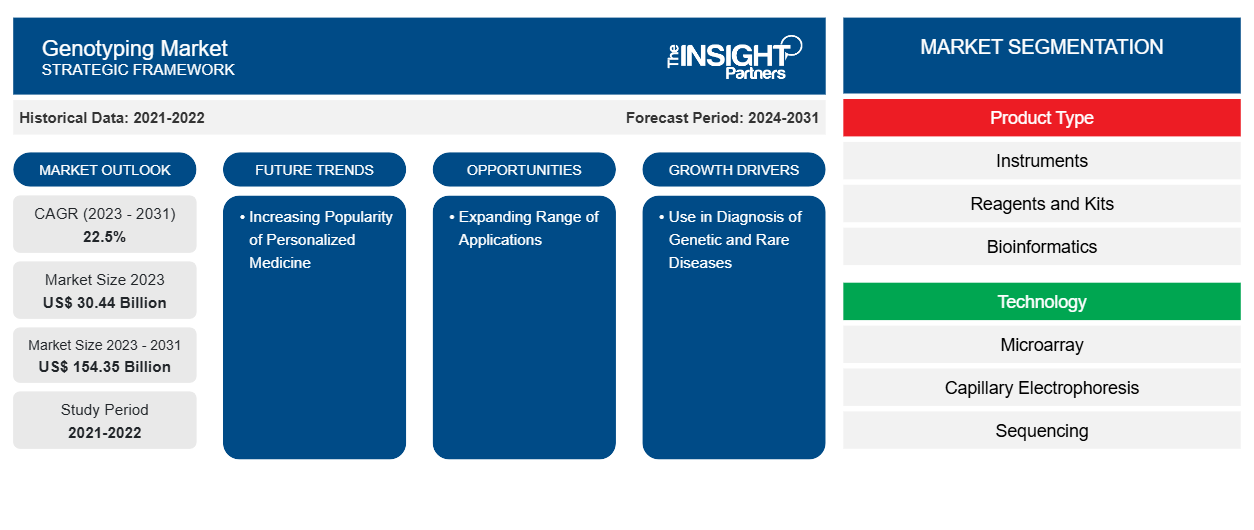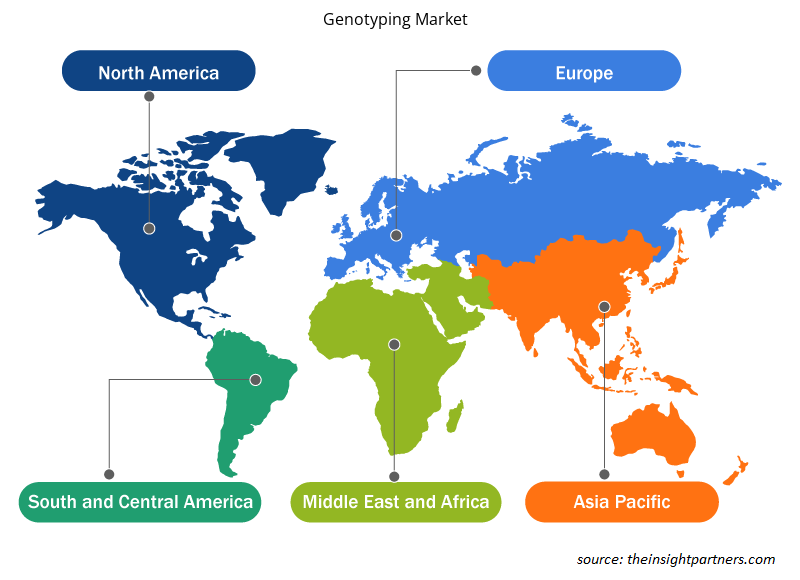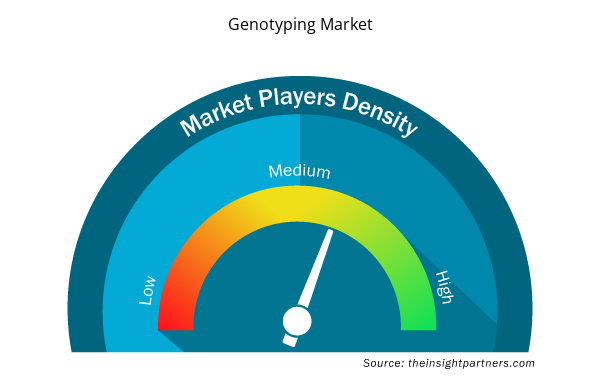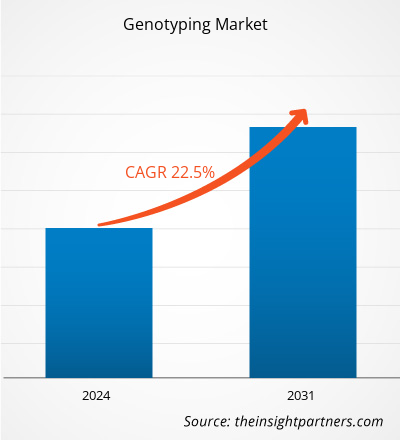The genotyping market size is projected to reach US$ 154.35 billion by 2031 from US$ 30.44 billion in 2023. The market is expected to register a CAGR of 22.5% during 2023–2031. A diverse range of applications of genotyping, including personalized medicine, agriculture, and animal breeding, owing to growing awareness efforts and campaigns would continue to be key trends in the market.
Genotyping Market Analysis
The development of high-throughput genotyping technologies as next-generation sequencing and microarray analysis has benefitted the genotyping market. The subsequently increasing use of genotyping in agriculture and animal breeding to improve crop yields, develop disease-resistant crops, and enhance livestock production is one of the key drivers for the genotyping market growth. The ongoing R&D activities in genomics, genetics, and related fields, leading to the discovery of new genetic markers and associations with diseases, are also contributing to the market progress.
Genotyping Market Overview
India has a relatively high prevalence of genetic disorders due to its vast population, high birth rate, and the preference for consanguineous marriage in some communities. Research and development (R&D) work is being carried out on human genetics, genome analysis, and precision medicine to potentially reduce the burden of such diseases by comprehending the mutation spectrum of diseases. These R&D programs are focused on implementing prenatal and newborn screening programs, developing cost-effective diagnostic methods for genetic diseases and affordable therapies for these diseases, and creating personalized medicine regimens.
Genetic disorders such as cancer are prevalent in India. According to the WHO, ~1.41 million people in India were suffering from cancer in 2022. The article titled "Breast Cancer Survival in India Across 11 Geographic Areas Under the National Cancer Registry Programme" lists breast cancer as the most common cancer in the country, as it accounts for ~28.2% of all cancer cases in females; ~ 216,108 breast cancer cases were reported in women in 2022.
Major programs and initiatives in the genomic research in India are mentioned below:
- DBT – Unique Methods of Management of Inherited Disorders (UMMID) Initiative
- GenomeIndia
- Human Microbiome Initiative of select endogamous populations of India
- Program on Monogenic disorders
- National Genomics Core
Thus, a surging number of programs and initiatives in genomic research would offer significant opportunities for the genotyping market growth in India in the coming years.
Customize This Report To Suit Your Requirement
You will get customization on any report - free of charge - including parts of this report, or country-level analysis, Excel Data pack, as well as avail great offers and discounts for start-ups & universities
Genotyping Market: Strategic Insights

- Get Top Key Market Trends of this report.This FREE sample will include data analysis, ranging from market trends to estimates and forecasts.
Customize This Report To Suit Your Requirement
You will get customization on any report - free of charge - including parts of this report, or country-level analysis, Excel Data pack, as well as avail great offers and discounts for start-ups & universities
Genotyping Market: Strategic Insights

- Get Top Key Market Trends of this report.This FREE sample will include data analysis, ranging from market trends to estimates and forecasts.
Genotyping Market Drivers and Opportunities
Use in Diagnosis of Genetic and Rare Diseases to Favor Market
According to the World Health Organization (WHO), ~35 million new cancer cases are likely to occur by 2050, a 77% increase from the corresponding 20 million cases in 2022. In 2022, the Alzheimer's Association stated that the number of people living with Alzheimer's in the US is rapidly increasing. The disease affects more than 6 million Americans from all age groups. As per the association's estimates, 6.5 million Americans aged more than 65 suffered from Alzheimer's as of 2022, and 73% of this population was aged 75 or older. As per a study published in the Journal of Health Monitoring, up to 300 million people worldwide suffer from rare diseases. Although individual diseases are rare, they collectively pose significant challenges to the global healthcare system.
Since cancer, Alzheimer's disease, and rare diseases are challenging to identify clinically, genotyping stands as the backbone of diagnostic testing in the population. DNA sequences obtained from genotyping can be compared to sample or reference sequences to determine variations. Genotyping is also employed to detect single-nucleotide polymorphisms (SNPs), which are minor variations in genetic complement within the population. The human genome has nearly 660 million SNPs, which makes them the most widespread genetic variation. Moreover, by comparing polymorphisms in healthy and diseased populations, genome-wide association studies (GWAS) can uncover links between common illnesses and SNPs. GWAS can untangle the molecular mechanisms in underlying disease states by finding probable causes. SNPs are even present in single-celled organisms, such as bacteria. SNP genotyping can differentiate between microbial isolates and could even be accustomed to identifying antibiotic-resistant strains. SNP-based strain detection has a significant impact on each pharmaceutical and clinical analysis, and it has also been used in infectious disease epidemiology.
Thus, the use of genotyping techniques in the diagnosis of genetic and rare diseases bolsters the genotyping market.
Expanding Range of Applications to Offer Opportunity for Market
Genotyping holds potential applications in diagnostic research, pharmacogenomics, and agricultural biotechnology. Moreover, this technique is suitable for a variety of plant breeding, forensic, and environmental testing procedures. Pharmaceutical companies are profiting from the availability of polygenic risk scores, substantial genetic databases linked to patient health information, and the sequencing data of clinical trial participants, among other advancements. The Industry Pharmacogenomics Working Group (I-PWG), an association of pharmaceutical companies, is actively involved in pharmacogenomic research. The I-PWG comprises 26 member companies that undertake numerous clinical trials annually, collecting DNA samples of study subjects as part of the protocol. With its focus on clinical pharmacogenomics, the I-PWG aims to generate opportunities for pharmaceutical companies in the coming years. In addition to its most frequent use in oncology research, clinical pharmacogenomics is also used for PGx studies conducted in non-oncology therapeutic areas such as rare diseases, immunology, and cardiology. A more comprehensive study involving the NGS of clinical trial samples allows for an elaborate genomic evaluation of trial participants, revealing both common and rare genetic variations. PGx includes the study of polymorphic differences in the determination of genomic-level drug/xenobiotic effects, drug response and disease susceptibility, and genotype/phenotype relationships. Therefore, the greater adoption of genotyping in various research areas would eventually lead to a rise in the demand for these techniques, creating significant opportunities in the market in the coming years.
Genotyping Market Report Segmentation Analysis
Key segments that contributed to the derivation of the genotyping market analysis are product type, technology, application, and end user.
- Based on product type, the genotyping market is divided into instruments, reagents and kits, bioinformatics, and genotyping services. The reagents and kits segment held the largest market share in 2023.
- Based on technology, the genotyping market is divided into microarrays, capillary electrophoresis, sequencing, matrix-assisted laser desorption/ionization-time of flight (MALDI-ToF) mass spectrometry, polymerase chain reaction (PCR), and others. The PCR segment held the largest market share in 2023.
- By application, the genotyping market is segmented into pharmacogenomics, diagnostics and personalized medicine, animal genetics, agricultural biotechnology, and others. The diagnostics and personalized medicine segment held the largest share of the market in 2023.
- Based on end user, the genotyping market is divided into pharmaceutical and biopharmaceutical companies, diagnostic and research laboratories, academic institutes, and others. The pharmaceutical and biopharmaceutical companies segment held the largest market share in 2023.
Genotyping Market Share Analysis by Geography
The geographic scope of the genotyping market report is mainly divided into five regions: North America, Asia Pacific, Europe, and the Middle East & Africa. North America dominated the market in 2023. Increasing adoption of technologically advanced products and solutions, and surging research and development activities are the factors benefiting the genotyping market in this region. Moreover, government-led programs such as the "All of Us Research Program," initiatives by various genomic communities, and the increasing awareness of genotyping services propel the market expansion across North America. Asia Pacific is anticipated to register the highest CAGR during the forecast period.
Genotyping Market Regional Insights
The regional trends and factors influencing the Genotyping Market throughout the forecast period have been thoroughly explained by the analysts at Insight Partners. This section also discusses Genotyping Market segments and geography across North America, Europe, Asia Pacific, Middle East and Africa, and South and Central America.

- Get the Regional Specific Data for Genotyping Market
Genotyping Market Report Scope
| Report Attribute | Details |
|---|---|
| Market size in 2023 | US$ 30.44 Billion |
| Market Size by 2031 | US$ 154.35 Billion |
| Global CAGR (2023 - 2031) | 22.5% |
| Historical Data | 2021-2022 |
| Forecast period | 2024-2031 |
| Segments Covered |
By Product Type
|
| Regions and Countries Covered | North America
|
| Market leaders and key company profiles |
Genotyping Market Players Density: Understanding Its Impact on Business Dynamics
The Genotyping Market market is growing rapidly, driven by increasing end-user demand due to factors such as evolving consumer preferences, technological advancements, and greater awareness of the product's benefits. As demand rises, businesses are expanding their offerings, innovating to meet consumer needs, and capitalizing on emerging trends, which further fuels market growth.
Market players density refers to the distribution of firms or companies operating within a particular market or industry. It indicates how many competitors (market players) are present in a given market space relative to its size or total market value.
Major Companies operating in the Genotyping Market are:
- F. Hoffmann-La Roche Ltd
- QIAGEN NV
- Merck KGaA
- Eurofins Genomics
- Thermo Fisher Scientific Inc
- BioTek Instruments Inc
Disclaimer: The companies listed above are not ranked in any particular order.

- Get the Genotyping Market top key players overview
Genotyping Market News and Recent Developments
The genotyping market is evaluated by gathering qualitative and quantitative data post primary and secondary research, which includes important corporate publications, association data, and databases. A few of the developments in the market are listed below:
- Standard BioTools Inc. launched NGS library preparation functionality on the X9 High-Throughput Genomics System. With this launch, customers can now perform real-time PCR and next-generation sequencing (NGS) library prep applications on a single benchtop system for the first time to support discovery through screening. (Source: Standard BioTools Inc., Company Website, May 2023)
- Bio-Rad Laboratories, Inc. launched PTC Tempo 48/48 and PTC Tempo 384 Thermal Cyclers, designed to support PCR applications in basic and translational research, process development, and quality control. The PTC Tempo 48/48 and PTC Tempo 384 Thermal Cyclers are the latest additions to the Bio-Rad portfolio of conventional PCR thermal cyclers. (Source: Bio-Rad Laboratories, Inc., Company Website, September 2022)
Genotyping Market Report Coverage and Deliverables
The "Genotyping Market Size and Forecast (2021–2031)" report provides a detailed analysis of the market covering below areas:
- Genotyping market size and forecast at global, regional, and country levels for all the key market segments covered under the scope
- Genotyping market trends as well as market dynamics such as drivers, restraints, and key opportunities
- Detailed PEST/Porter's Five Forces and SWOT analysis
- Genotyping market analysis covering key market trends, global and regional framework, major players, regulations, and recent market developments
- Industry landscape and competition analysis covering market concentration, heat map analysis, prominent players, and recent developments for the genotyping market
- Detailed company profiles
- Historical Analysis (2 Years), Base Year, Forecast (7 Years) with CAGR
- PEST and SWOT Analysis
- Market Size Value / Volume - Global, Regional, Country
- Industry and Competitive Landscape
- Excel Dataset


- Greens Powder Market
- Integrated Platform Management System Market
- Neurovascular Devices Market
- Vision Guided Robotics Software Market
- Smart Water Metering Market
- Drain Cleaning Equipment Market
- Electronic Data Interchange Market
- Energy Recovery Ventilator Market
- Electronic Shelf Label Market
- Mail Order Pharmacy Market

Report Coverage
Revenue forecast, Company Analysis, Industry landscape, Growth factors, and Trends

Segment Covered
Product and Service, Technology, Application, End-User and Geography

Regional Scope
North America, Europe, Asia Pacific, Middle East & Africa, South & Central America

Country Scope
Argentina, Australia, Brazil, Canada, China, France, Germany, India, Italy, Japan, Mexico, Saudi Arabia, South Africa, South Korea, Spain, United Arab Emirates, United Kingdom, United States
Frequently Asked Questions
The increasing popularity of personalized medicine would persist as a prime trend in the market in the coming years.
North America dominated the market in 2023.
The use in the diagnosis of genetic and rare diseases, and technological advancements and rising R&D investments in the biotechnology and pharmaceutical industry are among the most significant factors fueling the market growth.
The genotyping market value is expected to reach US$ 154.35 billion by 2031.
The market is expected to register a CAGR of 22.5% during 2023–2031.
F. Hoffmann-La Roche Ltd, QIAGEN NV, Merck KGaA, Eurofins Genomics, Thermo Fisher Scientific Inc, BioTek Instruments Inc, Xcelris, Trimgen Corporation, Illumina Inc, Danaher Corp, Bio-Rad Laboratories, HE Healthcare Technologies, Standard Biotools Inc, Laboratory Corp of America Holdings, Beckmann Coulter, BGI, Takara Bio, and Diasorin Spa are among the key players in the market.
Trends and growth analysis reports related to Life Sciences : READ MORE..
The List of Companies - Genotyping Market
- F. Hoffmann-La Roche Ltd
- QIAGEN NV
- Merck KGaA
- Eurofins Genomics
- Thermo Fisher Scientific Inc
- BioTek Instruments Inc
- Xcelris
- Trimgen Corporation
- Illumina Inc
- Danaher Corp

 Get Free Sample For
Get Free Sample For